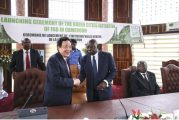Categories
Recent Posts
- Understanding the Biya Francophone regime’s support for the Israeli genocide in Gaza
- US: Prosecution lays out ‘criminal conspiracy’ as Trump’s hush money trial opens
- FAO formally launches Green Cities Initiative in Cameroon
- Football: Barcelona wants Clasico replay if Yamal ‘ghost goal’ call wrong
- Poverty under Biya: Cameroonians embrace Chinese language for brighter futures
Archives
- April 2024
- March 2024
- February 2024
- January 2024
- December 2023
- November 2023
- October 2023
- September 2023
- August 2023
- July 2023
- June 2023
- May 2023
- April 2023
- March 2023
- February 2023
- January 2023
- December 2022
- November 2022
- October 2022
- September 2022
- August 2022
- July 2022
- June 2022
- May 2022
- April 2022
- March 2022
- February 2022
- January 2022
- December 2021
- November 2021
- October 2021
- September 2021
- August 2021
- July 2021
- June 2021
- May 2021
- April 2021
- March 2021
- February 2021
- January 2021
- December 2020
- November 2020
- October 2020
- September 2020
- August 2020
- July 2020
- June 2020
- May 2020
- April 2020
- March 2020
- February 2020
- January 2020
- December 2019
- November 2019
- October 2019
- September 2019
- August 2019
- July 2019
- June 2019
- May 2019
- April 2019
- March 2019
- February 2019
- January 2019
- December 2018
- November 2018
- October 2018
- September 2018
- August 2018
- July 2018
- June 2018
- May 2018
- April 2018
- March 2018
- February 2018
- January 2018
- December 2017
- November 2017
- October 2017
- September 2017
- August 2017
- July 2017
- June 2017
- May 2017
- April 2017
- March 2017
- February 2017
- January 2017
- December 2016
- November 2016
- October 2016
- September 2016
- August 2016
- July 2016
- June 2016
Featured
 Understanding the Biya Francophone regime’s support for the Israeli genocide in Gaza
Understanding the Biya Francophone regime’s support for the Israeli genocide in Gaza  Poverty under Biya: Cameroonians embrace Chinese language for brighter futures
Poverty under Biya: Cameroonians embrace Chinese language for brighter futures  Cameroon is broken: Who can fix it?
Cameroon is broken: Who can fix it?  Ethiopia: U.S Senator Cardin Statement on the Killing of Bate Urgessa
Ethiopia: U.S Senator Cardin Statement on the Killing of Bate Urgessa  Battle for the Unity Palace: ANNOUNCEMENT!
Battle for the Unity Palace: ANNOUNCEMENT!
Most Commented Posts
 4 Anglophone detainees killed in Yaounde
4 Anglophone detainees killed in Yaounde
19 comments Chantal Biya says she will return to Cameroon if General Ivo Yenwo, Martin Belinga Eboutou and Ferdinand Ngoh Ngoh are sacked
Chantal Biya says she will return to Cameroon if General Ivo Yenwo, Martin Belinga Eboutou and Ferdinand Ngoh Ngoh are sacked
13 comments Anglophone Nationalism: Barrister Eyambe says “hidden plans are at work”
Anglophone Nationalism: Barrister Eyambe says “hidden plans are at work”
12 comments The Anglophone Problem – When Facts don’t Lie
The Anglophone Problem – When Facts don’t Lie
12 comments Largest wave of arrest by BIR in Bamenda
Largest wave of arrest by BIR in Bamenda
10 comments
Latest Tweets
Featured
-

Understanding the Biya Francophone regime’s support for the Israeli genocide in Gaza
-

US: Prosecution lays out ‘criminal conspiracy’ as Trump’s hush money trial opens
-

FAO formally launches Green Cities Initiative in Cameroon
-

Football: Barcelona wants Clasico replay if Yamal ‘ghost goal’ call wrong
-

Poverty under Biya: Cameroonians embrace Chinese language for brighter futures
-

US agrees to withdraw troops from key drone base in Niger
-

CPDM Crime Syndicate repays CFA39.8bn debt with new borrowings
© Cameroon Concord News 2024
19, April 2019
Southern Cameroons Crisis: EU Parliament Pushes Yaounde to the Wall 0
by soter • Headline News, Politics, World
Yaounde is under pressure and the pressure is coming from an unlikely source. Its usual allies are slowly jumping ship and this spells a disaster for a government that is on its last leg. The European Union has sent a tough message to Yaounde and sources at the Unity Palace say the bad news is keeping Palace’s occupants awake all night.
Though the French are still solidly behind the corrupt regime in Yaounde, Mr. Paul Biya, the country’s long serving president, knows that the tides are turning and turning very fast. The EU’s rhetoric is gradually changing and EU parliamentarians are not happy with the way the Yaounde government has handled the Southern Cameroons crisis that has put the country in the spotlight for all the wrong reasons.
For more than two years, the Yaounde government thought it had many allies and with such a played out mindset, it has gone about killing its own citizens, especially in the North West and South West regions.
But this week’s discussion of Cameroon in the EU Parliament has clearly revealed that Yaounde has no allies and its hopes of continuing to ride roughshod over the opposition have been dashed . Speaker after speaker at the EU Parliament only lambasted Mr. Biya’s long rule that is collapsing from within.
The EU Parliamentarians also pointed out that the mind-blowing human rights abuses in the country only spoke to the desperation of a regime that has overstayed its welcome.
The speakers clearly indicated that the EU had the means and resources that could bring down the gerontocracy in Yaounde. EU parliamentarians want to use their influence to mount pressure on Mr. Biya who has rejected all calls for an inclusive dialogue.
The EU might have been quiet for a long time, but its members have now decided to speak out and to call on France, the only big nation still supporting Mr. Biya, to take the appropriate steps that should lead to a peaceful and inclusive dialogue that the Yaounde government has rejected for years.
While EU Parliamentarians acknowledged that Cameroon was a strategic partner in the fight against Boko Haram, they also pointed out that good friends should also be reprimanded when they are straying into violence and irresponsibility.
The Cameroon government, they said, had used the fight against terrorism to stifle genuine political opposition. They stressed that in prosecuting its war against religious extremists in the country’s northern part, the Biya regime had committed despicable acts of atrocities that must be condemned.
They pointed to the killing of a woman and her children by government forces, adding that the videos of those killings did not show that those killed were terrorists. They also condemned the army’s reckless and wanton killing of innocent civilians in the two English-speaking regions of the country.
The EU Parliamentarians regretted the fact that the government had not displayed any remorse for the chaos it had created in the country, adding that the EU should help the thousands of Cameroonian refugees who are scattered all over Nigeria and those who have been internally displaced by irresponsible army soldiers.
The EU Parliament clearly backed the U.S. decision to curtail military aid to the Cameroon government because of its awful human rights records. They constantly urged the beleaguered Yaounde government to release Professor Maurice Kamto and his supporters, pointing out that Mr. Biya had been in power for far too long and should start thinking of transferring power to a younger and more democratic leader.
These unsettling messages from the EU Parliament come on the heels of the acerbic criticism by the U.S. Under-secretary of State for African Affairs, Tibor Nagy, who has openly congratulated Cameroon’s Diaspora for the effective public relations job it has done to bring the world’s attention to the unfortunate civil war that is playing out in Cameroon. Mr. Nagy recently said that he was looking forward to profound change in Cameroon following the collapse of Omar El-Bechir’s government in Sudan.
It should be recalled that Americans and Canadians have been working behind the scenes to get Mr. Biya out of power, though they have not produced any real results. With the EU now on board, it is clear that the coalition against the ruthlessly inefficient Yaounde government is widening and the collapse of Africa’s longest serving leader is imminent.
The Biya regime has bitten more than it can chew. It has overplayed its hands and it is now running out of luck. The multiple conflicts in which it is involved will very soon relegate it to the ash heap of history.
In the northern part of the country, Boko Haram is still a threat and the government’s reckless killing of innocent civilians there has only pushed young northerners into the arms of the religious sect and this is making it hard for it to win the war.
In the two English-speaking regions of the country, it is clear that there will never be any outright military victory for the Yaounde government despite its adoption of a scorch earth policy. Many Southern Cameroonians have been killed, but the will and determination of the people and fighters remain intact. Southern Cameroonians are resolute and they hold that co-habitation with a violent Francophone regime is impossible and that only separation will solve their problems.
The government’s mismanagement of the situation has radicalized even the most level-headed Southern Cameroonian. Even chiefs and parliamentarians have begun displaying their disagreement with the government strategy of killing all young adult males in the North West and South West regions.
In a dramatic turn of events in the country’s senate, the eldest member of the upper house, Chief Victor Mukete, put his frustration and disagreement with the government on display. He castigated the government, decrying the government’s insistence on addressing the issues only through military violence.
Chief Mukete who is not being taken seriously in the English-speaking regions had however made a point – Southern Cameroonians, even those in government disagree with the government’s strategy and if that does not change, they will jump ship.
The message is clear. Even within the military, there are many dissenting voices and this is causing the government sleepless nights. With the government facing a flood of opposition both within and from outside, it is clear that it will be changing its strategy in the days ahead for fear of being chased out of power, especially as rumor is swirling that Americans could arm Southern Cameroonians for them to head to French Cameroon so as to put an end to the political mess in Yaounde.
There is fear that all these unfortunate circumstances could connive to unleash a people power revolution in Cameroon. The north is already boiling. The English-speaking regions are in a civil war, while in the east of the country, Central African rebels have stepped up their attacks on government forces and refugees. The conditions for a long-lasting chaos seem to be in place in Cameroon.
The world does not want to see Cameroon go down that path. Their best solution is to elbow Mr. Biya out of power and there are currently talks between the great powers on how to achieve this goal without putting the entire region in a tight spot.
While the French have publicly displayed their support for the failing Yaounde government, they are however gradually conceding that Mr. Biya clearly belongs to the past. They hold that if he is not replaced, they could lose their interest in the region.
Mr. Biya is therefore on the ropes and given his age, he is clearly out of steam. The pressure is mounting and Yaounde is on the wall. The days ahead will be crucial, especially as Prof. Kamto’s supporters at home and abroad are scoring more points.
Another people power revolution is surely going to take place in Africa and this time around, it will be in Cameroon, as all the ingredients are already in place. The world will surely be playing spectator soon to the fall of another reckless and ruthless dictator.
By Kingsley Betek and Soter Tarh Agbaw-Ebai in the United Kingdom.